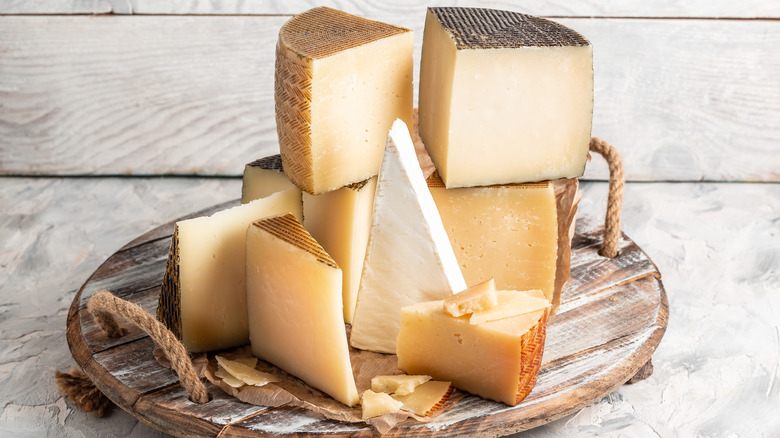The Reason You Might Feel Sleepy After Eating Cheese
We've all had those nights when we toss and turn trying to fall asleep. And surely, we've all tried following the classic methods for inducing a good snooze — counting sheep, listening to a lullaby, and, of course, drinking a warm glass of milk.
As it turns out, there's some truth to that last technique, and there's science to back it up. To set the record straight, it's not merely a cup of milk that will do the trick, but a cup of yogurt or a stick of cheese as well. It all has to do with the chemical components of dairy, rather than the edible form it takes. Mashed asked registered dietitian Brookell White, MS, RD, MyFitnessPal nutrition consultant, to explain just why eating cheese and other dairy products might make you feel tired.
If you've ever felt compelled to tap out for the night after grazing the cheese plate at a party, this might explain why. And if you're feeling hungry when bedtime comes around, you may want to grab a slice of cheese to top off the night.
Does cheese actually bring Z's?
How, exactly, does dairy affect sleep? It all comes down to tryptophan. "Dairy products, including milk and cheese, are high in tryptophan," says Brookell White, MS, RD. "Though studies have mixed results, tryptophan is a precursor to melatonin in the body. So it is possible dairy products could help with sleep."
White further explains that melatonin is "a hormone released by our brain in response to darkness" that can help regulate sleep. So if you need more tryptophan (and melatonin), eating cheese before bed could be a solid option.
Still, White adds that balance is key, citing a 2019 report from Today's Dietitian about foods that may negatively impact sleep. "Rather than concentrating on adding something to a nighttime snack, it may be more important to focus on the foods that may be contributing to lower quality sleep," she says. "Both alcohol and caffeine have been shown to be disruptive to your sleep as well as eating an unbalanced diet, especially one high in unhealthy fats and sugar." So instead of just relying on a dairy-laden late-night snack, making other healthy food choices may be a more dependable way to improve your sleep cycle overall. In essence, dairy might not be the end-all, be-all for your sleepytime needs, but rather, a helpful within a greater set of lifestyle changes.

